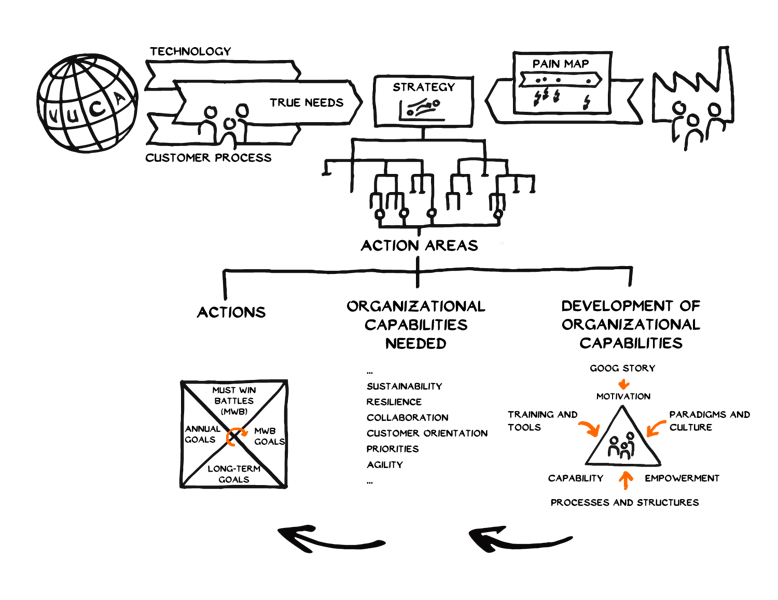
Fit for VUCA?
Everyone now accepts that the impact of Volatility, Uncertainty, Complexity and Ambuiguity - VUCA for short - is going to spread. And it's equally obvious that "more of the same" will not be enough to guarantee success in the long run. We need something new. One key element of that has to be a company's target state in a VUCA world, which will primarily be defined by the ability to reassert itself time and again in an increasingly unpredictable environment.
We're all now working from the theory that VUCA cannot be stopped, VUCA cannot be held back. Changes are happening faster and faster, and neither the intensity nor the direction of change can be predicted with any real certainty. It has even gone so far as to render previously reliable patterns unusable. What was once unthinkable or seemingly irrational is now suddenly embedded within this ever more complex and heterogeneous reality.
No doubt the reasons for these developments are multifaceted and there will be no end of side effects. If one thing is certain though, it's that the increasing speed of change is also a consequence of technological progress. Global real-time communication and computers able to execute 125,000,000,000,000 mathematical operations every millisecond are the key drivers.
All groundbreaking developments in artificial intelligence to the contrary, this steady decline in predictability is going to be an issue for some time to come. In part this is because rules and societal norms are breaking down. It's also because human beings have been fighting against the predictability of their own behavior since time immemorial. At the end of the day, many competitive advantages are built on the ability to surprise.
So if – because the technical options are available and because people behave in a way that promotes it – we can expect to face more and more unknown, unforeseen changes occurring at short notice, what do we do? In our day-to-day lives we've learned that preparation is a good response to the unknown – at home and at work. Preparation can take one of two approaches. The first is to carry as many pre-prepared solutions with me as exist on my journey into the VUCA world. With a little luck, I'll have a suitable solution on hand to tackle every new challenge. Like having a keyring that holds hundreds of keys. However, I can also opt to learn or develop skills that help me create appropriate solutions quickly. In that case, my keyring will ideally hold nothing more than a lock pick.
It's no surprise that both variants have pros and cons, but there's also no definitive right or wrong answer. The truth always lies somewhere in the middle. That said, in a world of growing volatility, uncertainty, complexity, and ambiguity, our forecasts show that the pre-prepared solutions option will become far less relevant over time. The keyring would be too large to carry around all the time, and searching for the right key in each situation would take far too long. So in the following we focus on the question of which capabilities will be most valuable when dealing with VUCA. And because we're talking about business, we're going to look at organizational capabilities1.
We spoke with a number of our clients as a means to start understanding how managers perceive these issues. The result is something of a chart rundown of the top 15 organizational capabilities. It's important to note that capabilities are like ingredients in a recipe – they interact and complement each other in different ways. The optimum combinations and weighting of the individual elements vary depending on the desired end result.


Top 15 Organizational capabilities
On their journey into the VUCA world, companies should be capable of
1. Enhancing customer orientation to identify and satisfy real customer needs and thus bind customers to the business in the long term. Because in the "economy of people" it's not enough just to fulfil specifications. To win you need to positively surprise customers and optimally support them in reaching their goals.
2. Setting priorities to allocate scarce resources to what's most important, so that those issues can be tackled fast enough. Because less is often more, and conscious abstention increases throughput and impact.
3. Realizing actions on time, on budget, and on specification (OTOBOS). Because the only good action is an implemented action. Plans and good intentions on their own are like tigers without teeth.
4. Boosting the organization's immune system to maintain its ability to take action even when conditions are bad. In times of increasingly intense competition, substance is the key to survival. This includes financial reserves as much as employees, robust processes, and a suitably differentiated service portfolio, as well as potentially a filled innovation pipeline or markets into which the company can pivot if worst comes to worst.
5. Building human capital to secure access to knowledge and skills. Because as automation and digitization progress unabated, qualified employees will be increasingly important.
6. Increasing efficiency to create leeway in terms of resources. Because future price competition will mean that targets have to be reached at the lowest possible cost.
7. Increasing effectiveness to make sure you're only doing things that add real value. Effectiveness means doing things right. And what's right is, ultimately, determined by the customer.
8. Driving innovation to secure competitive advantages. Fast-follower strategies might have worked well so far but will steadily lose relevance in a VUCA world. As such, the quality of the end-to-end innovation process is increasingly important.
9. Managing change so it doesn't overwhelm you. Because active participation makes success more likely.
10. Managing complexity to be able to respond flexibly to increasingly heterogeneous customer requirements. Because customers expect interconnected offerings that address individual needs and that integrate into their processes.
11. Maximizing agility to keep pace with change. Because in dynamic settings, being fast calls for short response times.
12. Creating transparency to improve management. Because information-based management helps ensure you make the right decisions, more often.
13. Delivering sustainability so that improvements have a long-term impact despite VUCA. Because success is not in perpetual motion, it's the result of a continuous improvement process.
14. Building resilience to be able to calmly handle setbacks. Because problems and challenges are all part of success – if you know how to deal. You should always emerge stronger after a failure.
15. Encouraging collaboration to optimally use the company's diverse knowledge and skills, thus freeing up motivation, commitment, and energy. Because a good system achieves more than the sum of its parts.
Since it's unlikely that you will (be able to) develop all of these organizational capabilities, focus is absolutely essential.
Which organizational capabilities will you need when, where, and in what form at your company to achieve your strategic objectives in a VUCA world? The answers here will be different – to give just a few examples – for capital-heavy production firms than for pure service providers, for companies in rapidly growing markets than for those in saturated markets, and for cost leaders than for quality leaders or niche providers.
Organizational capabilities are a means to an end
Taking this as read, the first step is to derive action areas and define relevant core actions or topics that are critical to implementing the strategy. The second step is to assign those core actions or topics to the respective organizational capabilities. So far, so good. Now all you need to do is build or develop those capabilities. Once again though, the corporate perspective is essential: initially it's not about any specific skills possessed by individual employees, but rather the capability of the company as a whole.

Figure: From strategy to execution
At the start, of course, the people in the company are motivated, e.g., to increase agility or implement OTOBOS actions. But alongside this motivation, capability and empowerment are absolutely critical to implementation. Banal though it might sound, in day-to-day corporate life, developing organizational capabilities is not just a task for HR. Quite the reverse. Incentive systems and training, processes and structures, and values and paradigms need to be aligned. Any imbalance poses a risk: motivation and capability without empowerment can only ever end in frustration or resignations. Motivation and empowerment without capability is a direct route to mistakes being made, while capability and empowerment without motivation just brings everything to a grinding halt.
Conclusion
Unpredictability is the very nature of VUCA. To best prepare for the unforeseeable, we recommend developing or reinforcing specific organizational capabilities. Employee training is only one part of that. You also need a system which, in an emergency, can call on and tie together the wealth of individual skills available while also ensuring they are able to deliver their full impact.
1An organizational capability is "an organized behavior within a company that is usually carried out repeatedly, at least in parts, and is made up of organizational routines and associated resources." (Sören Kupke, Allianzfähigkeit von Unternehmen [Alliance Capability in Companies], 2009)
More
Organisational Capabilities
- Strengthen customer focus
- Set priorities
- Implement actions
- Boost my organization's immune system
- Build up human capital
- Increase efficiency
- Increase effectiveness
- Promote innovation
- Manage change
- Manage complexity
- Increase agility
- Create transparancy
- Safeguard sustainability
- Build resilience
- Promote collaboration
Consulting Cases
Choice from Academy
- Lean Six Sigma Black Belt
- Lean Six Sigma Green Belt
- Lean Six Sigma Green Belt to Black Belt
- Six Sigma Yellow Belt
- Business Excellence for Executives
- Business Model Generation
- Change Canvas
- CIT Master
- CIT Practitioner
- Digitalization Excellence for Executives
- Understanding Customer Better
- Lean Six Sigma Master Black Belt
- Lean Transformation Belt
- Lego Process Facilitator
- Organizational Burnout
- Prozess Management Green Belt
- Work Life Balance